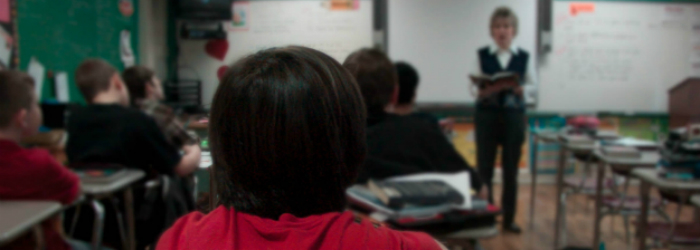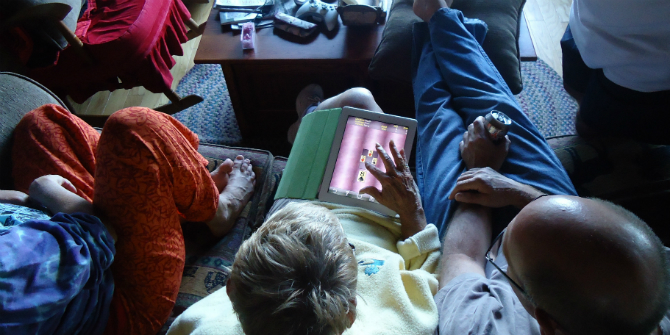 How do parents and carers approach bringing up their children in the digital age? Drawing on research for Parenting for a Digital Future: How hopes and fears about technology shapes children’s lives, Sonia Livingstone examines how children gain media literacy in after-school clubs, digital media learning sites, makerspaces and, of course, the home – often with undervalued parental support. This post is based on an article with Alicia Blum-Ross.
How do parents and carers approach bringing up their children in the digital age? Drawing on research for Parenting for a Digital Future: How hopes and fears about technology shapes children’s lives, Sonia Livingstone examines how children gain media literacy in after-school clubs, digital media learning sites, makerspaces and, of course, the home – often with undervalued parental support. This post is based on an article with Alicia Blum-Ross.
Schools often implement an instrumental version of media literacy, insofar as it is taught at all, not least because of hostility from government education policy to creative and critical approaches. Yet there is ample evidence that children’s spontaneous, interest-driven and informal opportunities to engage with digital media technologies result in diverse forms of knowledge of intrinsic, cultural and even instrumental value. Nonetheless, such opportunities are largely fostered through nonformal or informal rather than formal learning settings.
Children’s participation in nonformal learning, especially when they are young, often depends on parental actions. Yet both research on and provision for learning outside the home typically focuses on what the child does in the site as if they arrived there by magic, return afterwards to nowhere, and never talk about or follow up on what they learned with parents/carers at home. As Julian Sefton-Green and I observed in The Class: Living and learning in the digital age, an ethnographic study of a year in the life of a class of 13-year-olds:
“It perplexed us that neither the school nor the families could imagine what goes on outside their immediate gaze, leaving young people to move from home to school and back each day without the adults responsible for their opportunities really seeing how their lives do or could better fit together.”
Perhaps it can seem hazardous to educators to make assumptions about parents’ input? Both because parents are not within their sphere of control and so, frankly, may not act as desired. And because parents are unequally resourced, so building parental contribution into formal learning plans means building in inequality. But from the parents’ perspective, the sense of being on the outside of their child’s learning, tacitly or explicitly rebuffed by educators for what they can offer, is frustrating.
Most research on parental mediation of children’s internet use focuses on parental actions to minimise risk rather than, also, actions to maximise digital opportunities. But our research finds this to be just a subset of parental actions. Digital safety is high on parents’ agenda of anxieties but, nonetheless, is a hygiene factor – it needs to be taken care of but is not necessarily conducive to beneficial outcomes. As we heard from parents over again, though the risks worry them, they have bought technology to fill their homes, and they enrol their children in schools with the latest kit or afterschool clubs to learn coding, for positive reasons, and in anticipation of a digital future.
For educators and policy-makers, the popular (and expert) narrative of parental ‘deficit’ has two dimensions. On the one hand, parents from non-dominant communities are configured as a site of intervention, described only in terms of what they lack or are unable to do, notwithstanding evidence of how diverse parents support their children in learning and creating. On the other, the popularity of the ‘digital natives’ rhetoric, even though it has been substantially critiqued, means that parents are seen by educators as ‘digital immigrants’ unable to support their children in the new digital world. Even if this were once valid, it now fails to capture the generational shift in which today’s parents have themselves grown up in the digital age, often using digital skills in their own lives.
Indeed, in our research, we saw parents act as media mentors, brokers, co-learners, resource providers and more so as to help children develop the interests and values that may undergird their later pursuits and open up productive pathways to learning. Moreover, we found more instances of young people developing interests and passionate pursuits within, rather than despite, their home environment.
Originating in parents’ own interests, life stories or remembered childhoods, children’s interest-driven learning can often be traced back to parental practices and imaginaries as well as their access to resources, education and digital expertise. But insofar as researchers tend to position the family as the structure against which young people act, this obscures the role of parents in shaping their children’s prospects. This in turn results in a missed opportunity to engage parents positively, compounded by the perception among researchers, policy makers and practitioners that parents are hard to reach.
We suggest that educators would be wise to anticipate that parents will try to foster their child’s learning across sites, including at home. So why not design opportunities for parents to engage with and support their child before, during and after their participation in digital media learning and media literacy opportunities? Both children and also their parents stand to gain from such efforts.
First published at www.parenting.digital, this post gives the views of the authors and does not represent the position of the LSE Parenting for a Digital Future blog, nor of the London School of Economics and Political Science.
You are free to republish the text of this article under Creative Commons licence crediting www.parenting.digital and the author of the piece. Please note that images are not included in this blanket licence.
Featured image: photo by Kamaji Ogino on Pexels





